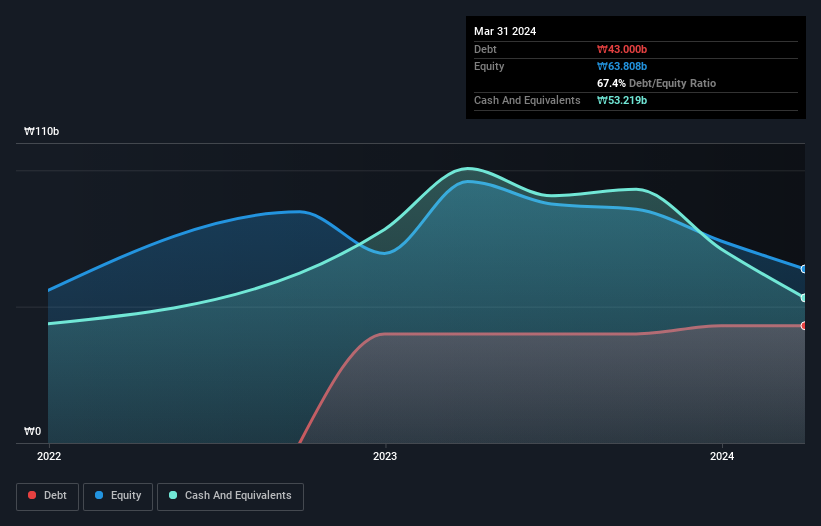The external fund manager backed by Berkshire Hathaway's Charlie Munger, Li Lu, makes no bones about it when he says 'The biggest investment risk is not the volatility of prices, but whether you will suffer a permanent loss of capital.' When we think about how risky a company is, we always like to look at its use of debt, since debt overload can lead to ruin. As with many other companies ABL Bio Inc. (KOSDAQ:298380) makes use of debt. But the real question is whether this debt is making the company risky.
When Is Debt A Problem?
Debt assists a business until the business has trouble paying it off, either with new capital or with free cash flow. If things get really bad, the lenders can take control of the business. However, a more common (but still painful) scenario is that it has to raise new equity capital at a low price, thus permanently diluting shareholders. Having said that, the most common situation is where a company manages its debt reasonably well - and to its own advantage. The first thing to do when considering how much debt a business uses is to look at its cash and debt together.
Check out our latest analysis for ABL Bio
How Much Debt Does ABL Bio Carry?
The image below, which you can click on for greater detail, shows that at March 2024 ABL Bio had debt of ₩43.0b, up from ₩40.0b in one year. But on the other hand it also has ₩53.2b in cash, leading to a ₩10.2b net cash position.

A Look At ABL Bio's Liabilities
Zooming in on the latest balance sheet data, we can see that ABL Bio had liabilities of ₩32.7b due within 12 months and liabilities of ₩44.2b due beyond that. On the other hand, it had cash of ₩53.2b and ₩247.8m worth of receivables due within a year. So its liabilities outweigh the sum of its cash and (near-term) receivables by ₩23.5b.
Given ABL Bio has a market capitalization of ₩1.12t, it's hard to believe these liabilities pose much threat. However, we do think it is worth keeping an eye on its balance sheet strength, as it may change over time. Despite its noteworthy liabilities, ABL Bio boasts net cash, so it's fair to say it does not have a heavy debt load! When analysing debt levels, the balance sheet is the obvious place to start. But it is future earnings, more than anything, that will determine ABL Bio's ability to maintain a healthy balance sheet going forward. So if you want to see what the professionals think, you might find this free report on analyst profit forecasts to be interesting.
Over 12 months, ABL Bio made a loss at the EBIT level, and saw its revenue drop to ₩33b, which is a fall of 68%. To be frank that doesn't bode well.
So How Risky Is ABL Bio?
We have no doubt that loss making companies are, in general, riskier than profitable ones. And we do note that ABL Bio had an earnings before interest and tax (EBIT) loss, over the last year. And over the same period it saw negative free cash outflow of ₩68b and booked a ₩39b accounting loss. With only ₩10.2b on the balance sheet, it would appear that its going to need to raise capital again soon. Summing up, we're a little skeptical of this one, as it seems fairly risky in the absence of free cashflow. When analysing debt levels, the balance sheet is the obvious place to start. But ultimately, every company can contain risks that exist outside of the balance sheet. Be aware that ABL Bio is showing 2 warning signs in our investment analysis , you should know about...
Of course, if you're the type of investor who prefers buying stocks without the burden of debt, then don't hesitate to discover our exclusive list of net cash growth stocks, today.
New: Manage All Your Stock Portfolios in One Place
We've created the ultimate portfolio companion for stock investors, and it's free.
• Connect an unlimited number of Portfolios and see your total in one currency
• Be alerted to new Warning Signs or Risks via email or mobile
• Track the Fair Value of your stocks
Have feedback on this article? Concerned about the content? Get in touch with us directly. Alternatively, email editorial-team (at) simplywallst.com.
This article by Simply Wall St is general in nature. We provide commentary based on historical data and analyst forecasts only using an unbiased methodology and our articles are not intended to be financial advice. It does not constitute a recommendation to buy or sell any stock, and does not take account of your objectives, or your financial situation. We aim to bring you long-term focused analysis driven by fundamental data. Note that our analysis may not factor in the latest price-sensitive company announcements or qualitative material. Simply Wall St has no position in any stocks mentioned.
About KOSDAQ:A298380
ABL Bio
A biotech research company, focuses on the development of therapeutic drugs for immuno-oncology and neurodegenerative diseases.
Reasonable growth potential with adequate balance sheet.
Market Insights
Community Narratives




